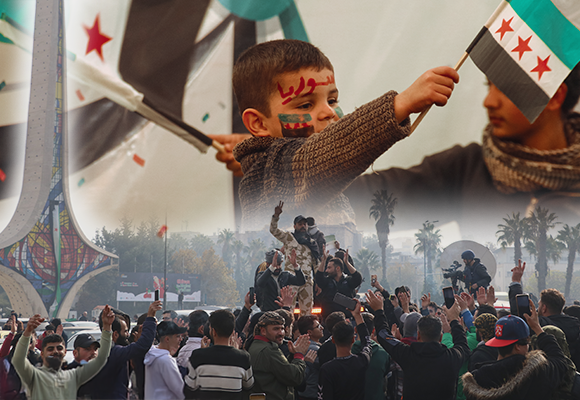
A new dawn has emerged in Syria, after Syrian opposition forces, led by Hay’at Tahrir al-Sham (HTS), entered Damascus on December 8 and ended the 54-year long rule of the Assad family. Immediately, videos and images of rejoicing Syrians who were forced to flee their homeland flooded social media and mainstream newsfeeds. Over the years of the civil war that began in 2011, some 13 million Syrians were either internally displaced (7.4 million) or made refugees (4.9 million) in neighboring countries and around the world.
At the same time, many policymakers and analysts from the United States and the West fear the geopolitical mess that could spill out of ousting Bashar al-Assad. There indeed is a serious political concern among observers, including Syrians, of the emergence of a post-2011 Libyan political reality of continued war, instability, and displacement as the immediate revolutionary elixir of the Assad regime’s demise fades and harsh political realities set in. These concerns are not unreasonable since there is a plethora of examples of failed democratization attempts and poor governing practices across the Arab world in recent years, with numerous states such as Yemen, Sudan, and Libya descending into state collapse and civil war after promising revolutions.
Many policymakers and analysts from the United States and the West fear the geopolitical mess that could spill out of ousting Bashar al-Assad.
The key to preventing a new chaotic and unstable political reality in Syria will inevitably be prioritizing the state-building process via preservation and development of state institutions. For Syrians to realize their dream of a sovereign and prosperous Syria, the new authorities in Damascus must preserve and reform existing state institutions in order to implement any common political framework achieved by the various local actors, including armed groups, former bureaucrats, and experts in the diaspora.
Learning Libya’s Lessons
Despite significant contextual differences, analyzing the Libyan experience with attempted post-revolution state-building can provide useful lessons for Syria. Qaddafi’s monopoly on political decisions left the majority of state institutions in Libya extremely weak. He shaped the Libyan state entirely according to his wishes and monitored most institutions and their decision making, in the process casting doubt on their legitimacy and effectiveness. Ultimately, when the Arab Spring reached Libya in early 2011 and toppled Qaddafi, there were no functioning state institutions left to rebuild Libya in a democratic and inclusive manner.
Qaddafi’s detrimental decision to fragment the Libyan military, relying predominantly on loyalist factions in the military, armed tribes, and foreign mercenaries in order to save himself from collapse proved to be one of the most damaging political decisions that would haunt Libya’s political landscape for years to come. When his regime finally fell and he was brutally killed in October 2011, nearly all Libya’s state institutions, which relied on him personally for command and direction, fell instantly. With numerous regional and global powers having ambitions and interests in Libya, different armed political factions were encouraged to try and solve Libya’s political nightmare through brute force, plunging Libya deeper into chaos.
With no functioning security system, Central Bank, or unified military, the state [in Libya] no longer had any sort of monopoly on violence and several groups, supported by different foreign governments with conflicting interests, emerged.
With no functioning security system, Central Bank, or unified military, the state no longer had any sort of monopoly on violence and several groups, supported by different foreign governments with conflicting interests, emerged. The chaotic political reality that emerged in Libya left the National Transitional Council (NTC), the transitional government established after Qaddafi’s overthrow, with the impossible task of building a successful democratic roadmap with the remains of a deceased state. With no functioning military available to dissolve competing militias, and no financial or security institutions available to rebuild the country or protect Libya’s finances and natural resources from being looted, the NTC failed to prevent Libya from falling into further instability.
Signs of Promise Amidst a Menacing Reality
Like Qaddafi, although to a lesser extent, Bashar al-Assad also personalized most ministries and state agencies by keeping them politically weak and controlling them through appointing members of his family and inner circle as their leaders, protected and legitimized under the cover of the ruling Baath Party. As a result of weak, corrupt institutions that largely relied on one family for survival, there is a serious risk of Syria going down a path of chaos and instability akin to many of its neighbors. This risk is severely amplified with the menacing foreign presence of numerous global and regional powers having conflicting interests in Syria. With some 830 Iranian, Turkish, Russian, and American military bases and sites in Syria (by mid-2022), and with Israel now using the opportunity of Assad’s downfall to illegally invade Syrian territory and aerially bombard Damascus, the new authorities in Damascus must get security institutions up and running quickly.
Nevertheless, there are signs of a better outcome for Syria because of the promising political maneuvering that has taken place by HTS so far. HTS, led by Ahmed al-Sharaa, more widely known by his nom de guerre Abu Muhammed al-Joulani, made welcome statements and pronouncements regarding protecting and rebuilding state institutions immediately upon entering Damascus.
Ahmed al-Sharaa, more widely known by his nom de guerre Abu Muhammed al-Joulani, made welcome statements and pronouncements regarding protecting and rebuilding state institutions immediately upon entering Damascus.
Most importantly, al-Sharaa, along with other opposition politicians, have announced general amnesty for soldiers in the Syrian Army, signaling their intention to preserve the unity of the military institution in order to prevent internal armed conflict during political reconstruction. The decision to grant amnesty to lower level soldiers suggests that al-Sharaa is acutely aware of not repeating the mistakes of Qaddafi in Libya or the Administrator of the Coalition Provisional Authority in Iraq Paul Bremer who dissolved the Iraqi Army following the American invasion in 2003, which destabilized both nations for decades. The military is the only state institution that can prevent conflicting armed factions from pulling Syria into another civil war. Any form of state-building by HTS and other groups would inevitably fail if the Syrian Army were not unified and militarily superior to any other armed faction.
The initial statements by al-Sharaa and HTS show a degree of political sophistication that was largely absent amongst the Syrian opposition since the beginning of the Syrian revolution in 2011. Al-Sharaa is not only aware of the importance of protecting key state institutions such as the military and Central Bank, among others, but is seemingly aware of the regional and global context that surrounds Syria and could drag it into further destruction and instability. This is why many applauded al-Sharaa when he publicly stated that Syria now is not in a position to wage a campaign against Israel, but also demanded an end to Israel’s illegal maneuvers and attacks on his country.
Yet it will take more than promising statements for Syria to truly stabilize given the geopolitical situation in the surrounding region. Military unification alone is not enough, as several degrees of reform in civil-military relations are required. Given Syria’s coup-rich history of disgruntled military officers overthrowing civilian presidents, the only way to prevent such a situation from repeating is having a Ministry of Defense that is subject to civilian institutions. Without a Ministry of Defense that is held accountable by political, civilian structures, a lurking threat of returning to an Assad-esque police state will loom over any democratization attempt. Similarly, the Syrian opposition is still widely divided, and there has yet to be large-scale political unification between factions. While the opposition was successful in uniting to overthrow Assad, the challenge of governing and giving political concessions will prove to be far more difficult.
Al-Sharaa and HTS do not yet have the widespread popularity nor the needed manpower to govern Syria alone. For al-Sharaa, his limited political and institutional expertise will likely prove to be a setback. Neither him nor anyone else in HTS have had meaningful, large-scale interaction with national institutions such as constitutional courts, local councils (outside previous rebel-controlled territory), or electoral commissions, all of which will be crucial in the transitional period. To govern a stable Syria effectively, al-Sharaa will need not merely signal political openness but will have to take the road less traveled and provide concrete political concessions to figures who possess institutionalized political experience.
To govern a stable Syria effectively, al-Sharaa will need not merely signal political openness but will have to take the road less traveled and provide concrete political concessions to figures who possess institutionalized political experience.
The only promising way forward is if HTS decides to work with more experienced politicians, judges, and legal experts who have more intimate histories with Syria’s state institutions, like former Prime Minister Mohammed al-Jalali, whom al-Sharaa has included in the fold of the current interim government. These individuals, together with scholars and legal experts in the Syrian diaspora, are the only few who can write a constitution and draw an effective political roadmap that governs the role of state institutions in citizens’ lives and reestablishes a social contract between the Syrian people and their government. Al-Sharaa and HTS must not take the easy route and sideline other Syrian factions, experts, and former bureaucrats in order to build a new state in their image, prioritizing ideological gains over long-term state building. To be sure, any such transitional edifice that HTS could bring forward on this basis is likely to fall into the cycle of state repression, instability, and ineffective governing once again.
Any US Role in Building a Stable Syria?
On the international scale, state-building must be the priority above all else. For the Biden and the future Trump administrations, the American role will likely not be a direct one in Syria, such as direct financial or political support, given President-elect Trump’s public desire to stay out of Syria. Nor is an interventionist and direct role needed in Syria. The US should simply provide logistical support to Syria through institutional and legal expertise, Congress’ Free Syria Caucus, or diplomatic channels.
The Biden and Trump administrations would do well to take the opportunity to remove al-Sharaa and HTS from the Foreign Terrorist Organizations list, internationally legitimizing the new Syrian regime that will help stabilize the Syrian state.
Al-Sharaa’s aforementioned statements about Israel, ethnic inclusivity, and openness are likely olive branches given by HTS in order to signal a political willingness to handle relations with the United States and western powers in a non-confrontational manner. As a result, the Biden and Trump administrations would do well to take the opportunity to remove al-Sharaa and HTS from the Foreign Terrorist Organizations (FTO) list, internationally legitimizing the new Syrian regime that will help stabilize the Syrian state. The visit by a US Department of State delegation to Damascus despite the designation signals that the United States is willing to take that step. With HTS being the largest local power broker in Syria, it is not in America’s best interest to start a uselessly confrontational relationship with HTS for seemingly no reason other than its leader’s checkered past. If the United States can provide simple, low cost, logistical support for the Syrian state and remove HTS from the FTO list, the Biden and Trump administrations can play a positive, non-interventionist role that prevents another suboptimal scenario that sees further instability and destruction.
The views expressed in this publication are the author’s own and do not necessarily reflect the position of Arab Center Washington DC, its staff, or its Board of Directors.

